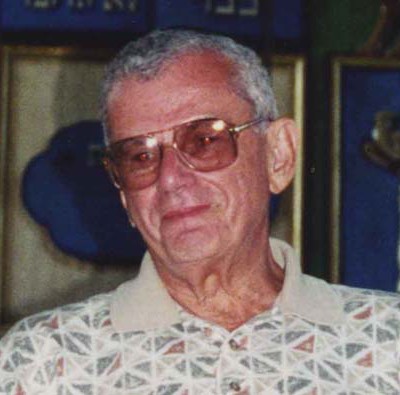
Moses and Perla Sittsamer lived in Mielec, Poland, northeast of Krakow. They shared a three-room apartment with their five children, Israel, Jack, Joseph, Devorah and Gitla. A disabled veteran of World War I, Moses Sittsamer became a traveling Singer sewing machine salesman. “My mother worked very hard, she didn’t work outside the house. She did the laundry, she cleaned the house, it was a tough job, and she worked very hard. But we were a very happy family,” Jack Sittsamer recalled in a 2006 oral history interview. The Sittsamers were a religious family. The children went to cheder (Hebrew school) every day after attending a Catholic school in the mornings.
The German army occupied Mielec in 1939 and deported the Jewish residents in March 1942, killing Moses Sittsamer during the long march out of the city and separating the family. Jack Sittsamer (1924-2008) never saw his mother or siblings again. Over the following three years, Sittsamer spent time in six concentration camps in Germany, Czechoslovakia and Austria: Mielec, Wieliczka, Flossenberg, Letimeritz, Mauthausen and Gusen II. When Allied forces liberated the Gusen concentration camp on May 5, 1945, Sittsamer was 19 years old and weighed just 72 pounds. Had he been forced to wait the three days until VE Day, Sittsamer later said, he might not have survived the war.
Sittsamer spent three months recuperating under the care of a retired nurse in Austria before traveling through Europe looking unsuccessfully for surviving relatives. He came to Pittsburgh in June 1949 through the sponsorship of the United Jewish Federation and took a job as a sheet metal worker for Tyson Metal Products, where he stayed until he retired in 1986.
“When I first came to Pittsburgh, it was the worst time of my life, worse even than the concentration camps, because I was all alone,” Sittsamer told the Jewish Chronicle in 1978. “I had nobody… But now I have great satisfaction in what I have, a home, family, a good job, investments. I know I made it all by myself. I survived.”
In 1953, Jack Sittsamer married Maxine Feldman. They had two children, Paula and Murray. Jack and Maxine Sittsamer were both officers at B’nai Emunoh Congregation, and Maxine Sittsamer was the first female president of the Greenfield congregation.
Jack Sittsamer initially refrained from discussing his experiences, even going so far as say that his “KL” (the initials of “concentration camp” in German) tattoo were the initials of an old girlfriend. He later became a volunteer with the Holocaust Center of the Jewish Federation of Greater Pittsburgh and dedicated himself to educating the public about the Holocaust. According to his obituary, he eventually told his story to more than 100,000 people through speaking events around the country. In 1996, the Holocaust Center produced a play, Mazel, based on his life. Four years later, in 2000, Sittsamer returned to Europe to visit his home and the scenes of his enslavement.